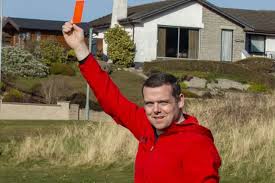Douglas Ross: A Rising Star in Scottish Politics

Introduction
Douglas Ross has emerged as a prominent figure in Scottish politics, representing the Scottish Conservatives. His leadership, particularly following critical political events, has shaped the party’s direction and strategy in Scotland. Understanding his role is crucial as Scotland navigates through significant political changes and challenges.
Early Life and Political Career
Born on the 27th of July, 1983, Douglas Ross grew up in Moray and went on to study at the University of Edinburgh. Before entering politics, he built a career in football officiating, which uniquely shaped his understanding of fairness and leadership. He was first elected to represent Moray in the Scottish Parliament in 2016 and quickly earned a reputation for his spirited debates and clear stances on central issues.
Leadership of the Scottish Conservatives
In 2020, Douglas Ross was elected leader of the Scottish Conservatives, becoming the youngest leader of a major political party in the UK at the time. His leadership came at a crucial juncture, as the party needed to consolidate its position in a politically-divided Scotland, particularly after the SNP’s continued dominance. Ross’s tenure has been marked by his strong opposition to the SNP’s governance and his calls for a united front against independence.
Recent Developments and Challenges
Since taking leadership, Ross has faced numerous challenges, including the ongoing debates around independence and the impact of the COVID-19 pandemic on Scottish society. In recent months, he has pushed for greater scrutiny of the Scottish government’s policies, particularly in areas such as education and health care, claiming that these sectors have been adversely affected by the SNP’s approach. A focal point of his current campaign is addressing the cost of living crisis, highlighting the need for immediate government intervention.
Conclusion and Future Outlook
As Douglas Ross continues to navigate his role as leader of the Scottish Conservatives, his ability to adapt to the shifting political landscape will be vital. With upcoming local elections in 2025, forecasts suggest that his leadership style and strategies will face significant tests. Observing Ross’s decisions in the coming months will provide insight into not only his future as a political leader but also the direction of the Scottish Conservative Party as it seeks to regain traction amidst a competitive political environment.








